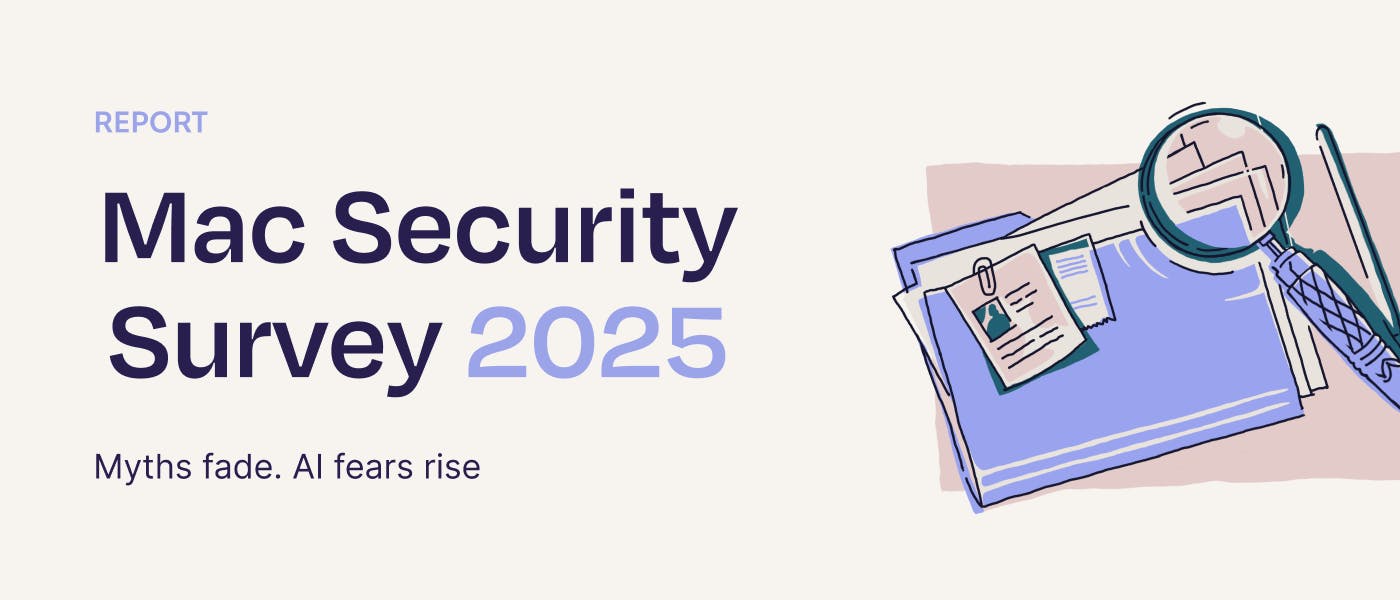by Moonlock Team
For years, a common belief floated around the tech world: Macs are inherently safe. This idea of a digital fortress, immune to the malware that plagued other systems, offered a sense of security to many users. But the digital landscape is in constant motion, and perceptions are beginning to shift. The era of feeling untouchable is drawing to a close.
At
The Myth of the Untouchable Mac Is Fading
The idea that Macs don't get malware is losing its grip. Our survey found that only 15% of Mac users still believe their operating system is immune to malicious software. This is a dramatic drop from 2023, when nearly twice as many (28%) held that belief.
This growing awareness isn't just a feeling; it’s rooted in experience. A staggering 66% of Mac users reported facing at least one cyber threat within the past year. As these encounters become more common, the need for proactive security becomes clearer. Almost half of the respondents (46%) now say they need additional security software because they feel macOS isn't secure enough on its own.
What's driving this shift? Researchers at our Moonlock Lab have a few ideas.
In 2024, malware detections on Macs protected by Moonlock Engine rose by 20% compared to 2023. As more people experienced malware firsthand, their perception of Mac security may have soured. We’re also seeing hackers move on to more targeted, sophisticated malware, leaving adware and PUAs as petty tools. They create new macOS stealers and backdoors instead, draining victims of all passwords and credentials.
— Mykhailo Pazyniuk, Malware Research Engineer at MacPaw’s Moonlock Lab
This evolution from nuisance adware to financially devastating infostealers leaves a much stronger impression. The threat is no longer just annoying; it's industrialized and dangerous.
AI Sparks a New Wave of Concern
As one belief fades, a new concern has emerged to take its place: artificial intelligence. The rapid rise of generative AI has captured the public imagination, but it has also stoked significant fear. An overwhelming 72% of Mac users worry that AI will accelerate the development of advanced cyber threats.
There's a clear sense of unease. While many are integrating AI into their daily lives, over half of the users we surveyed feel they lack control over the data they share with AI tools. This creates a difficult paradox. Only 34% believe that AI-powered security tools can make them feel more protected, suggesting that for many, AI currently feels more like a threat than a solution.
AI accelerates the cat-and-mouse game we’re in. Malicious actors use it to boost the performance of their social engineering attacks and scale them more quickly. On the other hand, security teams are getting faster in detection, analysis, and blocking threats with the help of AI too. Where will the scales tip? It seems it may never settle.
— Kseniia Yamburh, Malware Research Engineer at MacPaw’s Moonlock Lab
These fears aren't unfounded. Moonlock Lab has already identified real-world examples of AI being used for malicious purposes, including a macOS stealer
Perceived Dangers Don't Always Match Reality
Our survey also uncovered a curious disconnect between what users fear most and the threats they are most likely to encounter. Identity theft, for example, is a top concern for 72% of users, yet only 16% have personally experienced it.
Malware, however, tells a different story. While it has directly affected nearly one in three Mac users (31%), it doesn't even rank among their top five concerns. This suggests that while users are more aware of malware, they may still underestimate the personal risk and potential damage it can cause.
This gap is most visible in user habits. While awareness is up, risky behaviors persist. 64% of respondents believe that the right software alone can offer complete protection. This over-reliance on technology as a silver bullet is dangerous, especially when paired with lax security practices. Our survey found that 48% of users reuse passwords across multiple accounts, and 59% save them directly in their web browsers, creating a prime target for attackers.
Infostealers are growing on Macs, and how people handle their passwords can determine whether the damage stays minor or ends in a total account takeover.
— Kseniia Yamburh, Malware Research Engineer at MacPaw’s Moonlock Lab
Why This Matters
The shift in perception among Mac users is a crucial step forward. Acknowledging that no system is invincible is the first line of defense. However, awareness alone isn't enough. The findings from the Moonlock Mac Security Survey 2025 highlight that the next step is bridging the gap between perception and action.
It means moving beyond an over-reliance on software and building stronger, more consistent security habits, especially around password management. It means understanding that threats like malware are not distant problems but immediate risks with real consequences.
And in an era where AI is rapidly changing the game, staying informed and seeking out trusted guidance is more important than ever. The fortress may have been a myth, but a secure Mac is not. It just requires a combination of the right tools and, more importantly, the right knowledge.


